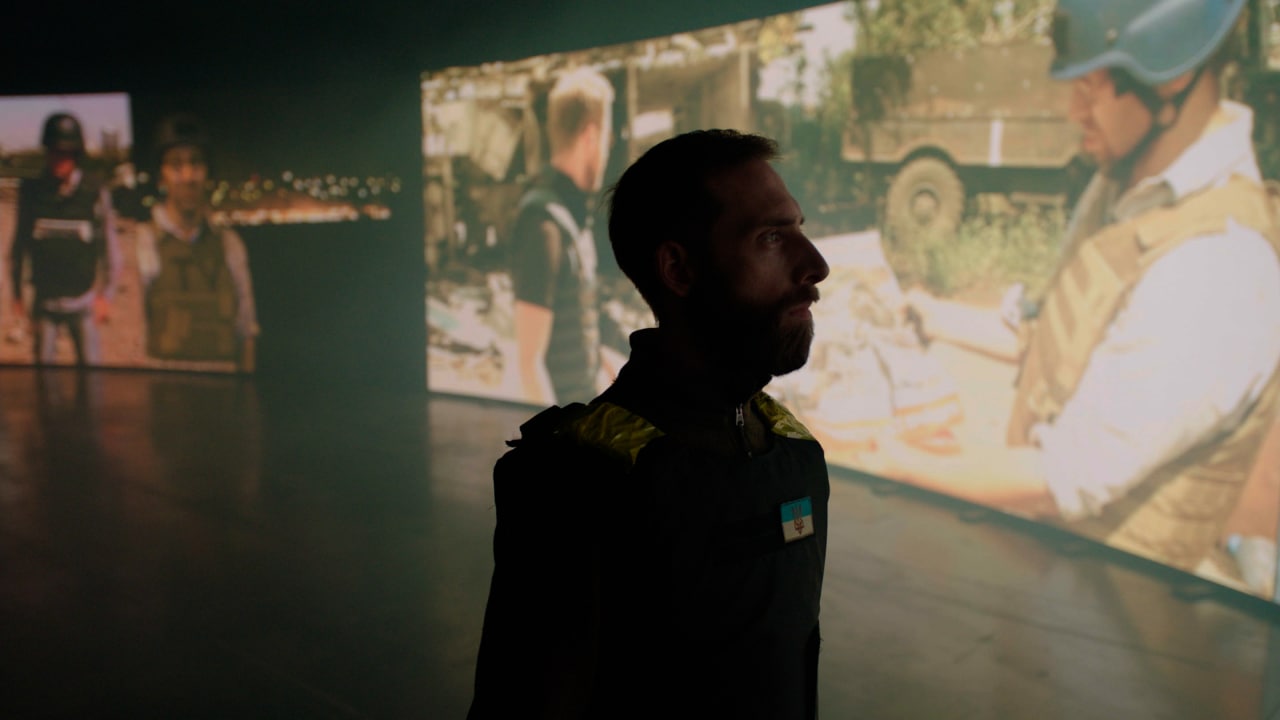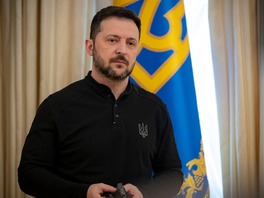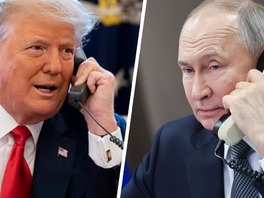Very soon, the Cannes Film Festival 2022 will feature an ultra-important Ukrainian documentary called “Life to the limit”, which reveals to the world what Ukraine is, who Ukrainians are and why the war in Ukraine began not on February 24 but 8 years ago. "Apostrophe" talked to the creators of the movie, including director Pavlo Peleshko and producer Yurii Ivanyshyn, who with the wreckage of memories and their own video archive will demonstrate why it became possible for the Russian-Ukrainian war to take place in the twenty-first century.
- How did the idea of your new movie come up?
Y.I. It all started on the night when the students were first beaten (the beginning of the Revolution of Dignity, Maidan). I understood what was going on and decided to make sure that we could stream 24 hours a day everything that was happening at the Maidan. We placed our cameras on the highest spots from where one could stream: roofs, houses, hotels.
After Maidan, our friends from the press called us and said that the Russians had increased their activities in Transnistria. Back then, we had our prototype of the radio-controlled plane, so we went there, launched the plane, and saw a military base, where active preparations were indeed carried out. We lost our plane, it was shot. That was our first experience of aerial reconnaissance. The next day, the website of the KGB of Transnistria reported that right-wing representatives were flying over Transnistria.
After that, Pavlo and I got into the car and drove through the east of Ukraine: back then the separatists were all around. In Kharkiv, Pavlo was doused with gasoline and almost set on fire. We reached the South. This gave us some understanding of what was happening, and we tried to join the Armed Forces of Ukraine, an air reconnaissance unit in particular. In June 2014, we already got into the volunteer battalion "Donbas".
Pasha and I were volunteering for the whole year until we signed a contract in 2015 since we needed a somewhat legal status. That's how our military experience began.
- And when did you manage to release the Winter on Fire movie on Netflix?
Y.I. In March-April 2014, we carried out painstaking work for two months, then we enlisted, and in 2016, we learned that Winter on Fire was suddenly shortlisted for Oscar. Well, our commander said,‘Yura, Pasha, you should be there, you have to go to Los Angeles!’They helped us, and so we got to Los Angeles for the Oscar ceremony. There, our internal metamorphoses with Pasha began – from the trenches and the war we suddenly got into the world of serenity.
 Pavlo Peleshok, Anastasia Borodenkova and Yuri Ivanishin in Cannes
Pavlo Peleshok, Anastasia Borodenkova and Yuri Ivanishin in Cannes
P.P. In fact, our new movie is an unofficial sequel to Winter on Fire, if that applies to a documentary. This is a continuation of the movie about the Maidan and a story about what happened to Crimea and Donbas. This is a project that should draw the world's attention to what was happening and is still happening in Ukraine.
An important element of our movie is music. We have a wonderful composer, Oscar Senen, who participated in writing music forCode da Vinci and 007: No Time to Die. I was very glad that Oscar agreed to participate in our project, we discussed this for a year and a half. We also worked with Hardkiss, Motanka.
- Being both people of art and direct participants in all the events captured in the movie, is it easier for you to explain to the world what Ukraine is, why the war is happening?
P.P. It's both easier and harder at the same time. When we edited the scenes from the Maidan, I didn't want to repeat the previous movie, but we also wanted to show those who didn't watch it the cause-effect relationships. It was quite difficult to pick a team 7 years after the Maidan when the structures like Star Media and Film Ua kept making series for Russia as if nothing had changed over the years. Hiring a director, editor, or anyone from the staff, I had a question "Whom does Crimea belong to?", testing them and checking for adequacy. It's not that normal in our country to start looking for employees like that, is it? But these are our realities.
Each of the editors wanted to show the Maidan, how people were shot. However, there is a phenomenon called "pornography of violence" explaining that the brain stops accepting violence after 3 minutes. And how can you show the war after such footage of the Maidan? Therefore, we decided not to show the dead but the faces of people who saw death – emotionally it worked much stronger.
 Pavel Peleshok, Vladimir Kiyan ("Typhoon") and Yuri Ivanishin
Pavel Peleshok, Vladimir Kiyan ("Typhoon") and Yuri Ivanishin
It's also difficult to edit the war footage because it seems to me that it doesn't work like that: those "boring" shots – all of this Yura and I witnessed with our own eyes, my eye is "washed" with war. But others said those were unique shots and scenes.
- Many of our fighters who came from the ATO to Kyiv said it did not feel like war in here at all, is it true?
Y.I. Exactly. Pasha could not go to any supermarket after the return. It seemed that people looked at you with condemnation. Mentally, it put a lot of pressure.
After the United States, we returned to our unit shortly and decided to shoot further after the war. We realized that people did not know what Ukraine was, and much less who Ukrainians were. In 2020, after returning from the army, Pasha and I started making a movie.
We decided that we would not tell much about Russia, or the Russian authorities. Because this way we would create some monster from Putin, and the “monster” is perceived by people as an “incredible”, extraordinary person – that is the paradox. In fact, he's just a nobody, he needs to be forgotten. We needed to talk about ourselves, who we are, what we are fighting for, and why we are fighting. We understood it was much more important.
 Pavel Peleshok in Donbas with a dog
Pavel Peleshok in Donbas with a dog
In the movie, starting with the annexation of Crimea, we talk about our path, and how we have transformed to make it clear to the whole world that at this moment we are trying to finally defend our thousand-year-old country, our independence completely. I really want people all over the world to understand that the Ukrainian spirit and courage that everyone is talking about now exists due to our thousand-year history. And throughout this whole period, we have had a lot of heroic moments that few people know about.
- What messages did you want to convey with this movie?
P.P. For me, the key message of this film is that Russia does not export any values at all but, on the contrary, depreciates them. In addition, everything they have is stolen – from the history of the neighboring state, that is, us, to the scientific developments. Russia could not even make a razor, it stole the dumplings, and that’s not even mentioning flying into the space. That is, Russia is a country that does not exist.
The film itself is about us, Ukrainians, and why we have nothing in common with Russia. After all, we kneel together and mourn our guys who are brought home for the burial, while the Russians bury theirs just like dogs, in silence. They participate in a bunch of wars, and their people mean nothing at all to them, even sons mean nothing to their mothers, who rejoice at a hundred bucks given for their death.
A Western viewer should have the following picture: the war has been ongoing for 8 years, not 2 months, and what is happening now is the consequence of the fact that the world failed to react to the occupation of Crimea and the outbreak of the war. They were merely "deeply concerned". Parallels with Hitler, Europe of the 30s, the Anschluss of Austria, the attack on Poland, etc. are already obvious here.
Y.I. I always thought that if the state does not invest in two things – education and culture – then this state is doomed. Education and culture are the cornerstones, the foundation. If we had started investing in it 30 years ago, correctly and significantly, today maybe there would have been no war at all. All politicians are happy that Ukraine is united today more than ever, but we want to be united not through the suffering and war but based on a firm foundation. And we have the foundation, we have a thousand years of the foundation. One just needs to know it and to talk about it.
- Will they hear us?
Y.I. We are Europeans and currently, we are defending not just Ukraine but also those European values we had a thousand years ago. The EU should understand that we are Europeans not because we want “to join Europe”, but because we have been Europeans for a very long time. In general, the question of who we are, in my understanding, is the most important, because you understand who you are, what you need, what is your goal, and how you can achieve it only by realizing who you really are. Self-identification, understanding that is what gives you the future. That's why Pasha and I decided to highlight it in the first place, and that is why it is the most important thing.
- How are you going to promote this film in the world?
Y.I. We would really like to make a private show in Cannes in mid-May, where the festival will be held. Perhaps - within the framework of the Ukrainian salon, if the Ministry of Foreign Affairs will facilitate.
Perhaps we will create a separate pavilion in Cannes, where we will gather all Ukrainians, a Ukrainian product, and will stage a powerful action. Ukrainians are feared, not without the help of Russian propaganda, but still. Therefore, we must talk about ourselves as much as possible and tell what we are really doing and why, so that it is easier for everyone to communicate with us, take our side and understand that we are just civilized people as well.
P.P. Even before Russia's full-scale invasion, I said that the festival story is a little different, since we will not be able to show the movie anywhere but on the closed screenings. After that, we changed the strategy and signed an agreement with a French distribution company to finish the movie as soon as possible and release it on the national television of the European countries.
Everything changed on February 24. Now we want the screening in Cannes and the film itself to become a tool for the authorities that will help them talk about Ukraine, and emphasize how important is what is happening right now. The word "war" is depreciated, we must explain that our war is different from others.
- Do you believe in changes in the country after the victory?
- Yes, there will be changes. For example, my son, who is in a patriotic school. I came back from the ATO, and my wife told me that our boy had picked up a fight with someone. It turns out that there was a lineup for September 1, the anthem was playing, and in front of him, there was a guy who turned his head and said "What kind of rag is this?" meaning the national flag. My son immediately reacted…
A rejection of all Russian will take time, it will happen naturally. For example, I spoke Russian until 2016. And now there are Ukrainians and there are "hahly." Ukrainians are cool, fashionable, stylish, and "hahly" work in Russia during the aggression, where they are laughed at.
I was born in Voronezh, my father was a military man, we often moved from city to city, and in the first grade, I lived in Rivne, and studied in the Russian class! My grandfather is also a military man, he served in the Navy in Sevastopol, I loved him very much. Before he died 3 years ago, I managed to talk to him on the phone after returning from the ATO. I thought he would criticize me, and talk about Bandera. But he said a very important phrase: "Grandson, you're doing everything right. Forgive me." At the same time, I am not in touch with other relatives from Russia, and this does not bother me very much. My grandfather said that if we had to go into war with them, he would have understood it. That is, a person understood the value of everything.
- When will our viewers be able to watch the fmovie?
Y.I. The final cut should be ready by mid-May. First, there will be closed screenings in many countries. But the goal is not just closed screenings as such, but an action where we can bring a lot of materials about Ukraine and tell about Ukrainians. After that, I'll be ready to give away this movie. And again, the same Netflix may be interested in this movie only after they saw it at one of the screenings and said "yes, we're interested."
Until the end of summer, I would really like the premiere to take place somewhere in the world market, and in Ukraine, we can make the premiere much earlier, perhaps even in June.





